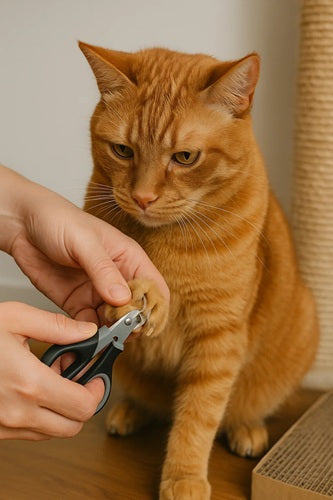How To take Care of a Kitten
Having a kitten involves a great deal of fun, cuddles and cuteness. But it also involves loads of hands-on attention, care and detailing.
In fact, just as human babies require constant care, so does a kitten. Providing proper care and attention at this critical stage of life increases the odds of the kittens growing up to be healthy and well-adjusted adult cats. This blog will provide you with some helpful tips to take care of your kitten.
Preparations prior to your kitten's arrival:
There are some preparations that can be made prior to your kitten’s arrival at home. These includes
Taking care of your new kitten:
Feeding:
Ideally, kittens stay with their mothers and litter mates until they are at least eight weeks old. Kittens are usually weaned by this age, however, if your kitten hasn’t been weaned or is still quite young, her feeding requirements would need special attention. Newborn kittens until 8 weeks old, should be bottle-fed kitten formula to ensure the nutritional needs are met. Kittens cannot be fed cow milk as it upsets their stomach. Weaned kittens over 8 weeks old can be fed solid kitten food. Kitten food is designed to have larger quantities of protein, minerals and amino acids as compared to adult cat food. Hence, choosing the correct food for your kitten is critical. Treats should be provided in small quantities so as to ensure a balanced and nutrition-filled diet. Water plays a critical role in her diet too, so ensure adequate access to clean and fresh water at all times.
Preventive care:
Vaccinations help prevent diseases like feline leukemia, rabies and feline distemper, these diseases could be fatal and should not be overlooked. Scheduling a visit to your vet to define the vaccination schedule is an important first step when you bring home your kitty. Taking regular visits to the vet helps your kitten become familiar and comfortable with the vet. Kittens mature into adult cats within five to six months, so talk with your vet about spaying or neutering if you so desire.
Entertainment and stimulation:
Cats need entertainment to keep busy. Provide your kitten with cat toys to stimulate their physical as well as mental development. Cats also need toys based on their age and stage of development. For example, a teething kitten would need a chewable toy to satisfy her urge to chew and lessen the ache in her gums. Interactive toys are recommended for cats that stay indoors for many hours. Chasing a toy mouse or a laser point, ball board games, treat-dispensing toys, etc are some of the other useful toys that add joy to the kittys day and provide an outlet for their energy.
Grooming:
It’s important to acclimate your cat to grooming at an early age. Grooming should be acknowledged as routine care provided to them. When grooming becomes an enjoyable bonding activity, your kitten won’t resist the process. Grooming is essential for their overall hygiene, it includes bathing, brushing their coat, trimming their nails and coat, etc. Starting early and making grooming a comfortable and positive experience helps to avoid any negative association in the future. Alternatively, you could even take your kitten to a groomer. Either way, providing timely and safe grooming will be beneficial for your kitten.
Provide litter training:
Training your cat to use a litter box is important. It is best to start the training when she’s a kitten so that she adapts to it quickly. When cats use litter trays it helps maintain optimal hygiene and a clean house. Choose a litter box that is easy to climb in and out of. Keep the litter box away from her play area. As an encouragement, you may even reward your kitty with treats each time she uses the litter box. Keep up with the training until she instinctively uses the litter box of her own accord.
Bonding time:
Spending quality time with your kitty helps her grow into a happy, healthy cat with a positive personality. Take your cat for walks, allow her to socialize with other people as well as animals. Prepare different activities that could keep her entertained and stimulated while spending time with you. Cuddling while watching tv, chasing around the house, even grooming her yourself can be some of the things you do together to create those perfect little bonding moments.
Good habits are better started at a younger age. Certain habits such as litter training, comfort with grooming, being well socialized are important habits to build while your kitty is young. Start early to have a friendly, happy, well developed feline.

















